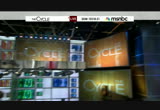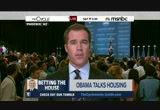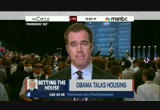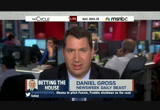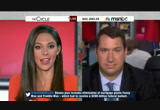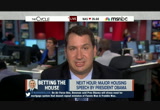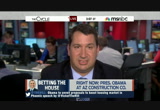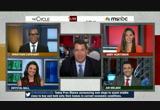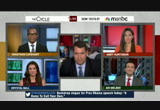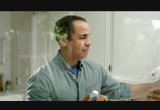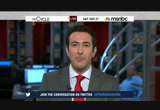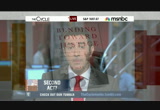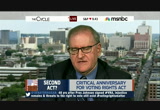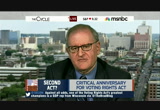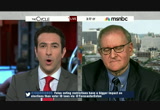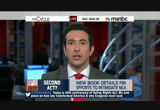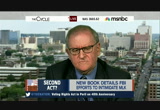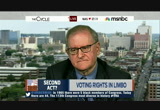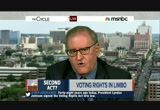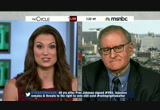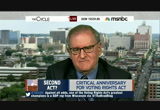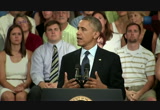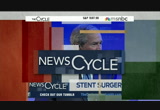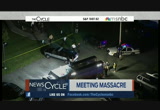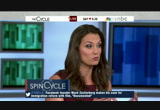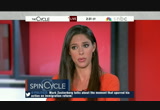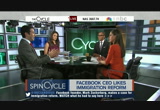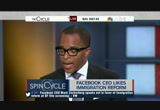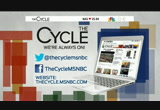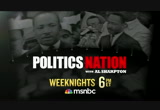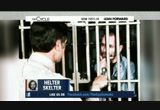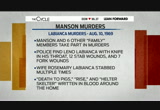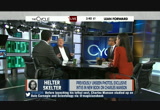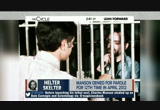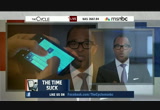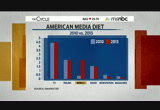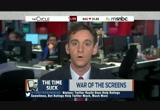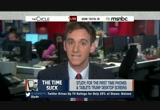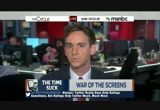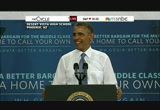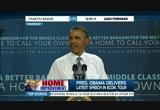tv The Cycle MSNBC August 6, 2013 12:00pm-1:01pm PDT
quote
12:00 pm
i'm krystal ball. right now on "the cycle," betting the house. president obama travels west and promises a north star for struggling homeowners. a landmark piece of civil rights legislation turns 48 today, but its future
12:01 pm
this hour he'll tour a construction company in the hour before laying out his plan for the future of american homeownership. it's a big task indeed. the white house is billing it as a major policy speech in a part of the country that was hit so hard by the housing crisis but has also seen a remarkable comeback. home sales in the phoenix area are up 4% from
12:02 pm
already put the president in a race against time on this one as well with rates edging toward 5%. thousands of borrowers are priced out of any benefit from refinancing. >> nbc's peter alexander is traveling with the president in phoenix. peter, what do we expect to hear today? >> reporter: krystal, we'll hear from the president about an hour from now. this, of course, is the next leg on his summer road tour, where he's promoting progress in the economy right now as he prepares for some budget battles with republicans when their recess ends, when congress' recess ends about a month from now. this, in many ways, can be viewed as a victory lap for the fledgling housing recovery, but the president will note in his remarks that the race is not over yet. you mentioned a lot of the highlights we'll hear from him a short time from now. he's going to call for more mortgage refinancing and an overhaul of the mortgage finance system that exists presently, including, as you said, the winding down of the government backed programs of fannie mae and freddie mac that presently
12:03 pm
represent about half of all mortgages. what the president's really been pushing for is a firewall that will protect taxpayers. you'll remember it was about a $187 billion bailout for freddie and fannie that a lot of people have been so opposed to. why does he come here to phoenix? well, phoenix, the m insists, is evidence of the progress that's been made. it's gone up about 30% from its bottom, but it's still about 40% from the peak in 2006. people in this area say a lot of the new housing purchases is due to investors, big-money investors who have been spending all cash, not to first-time home buyers, or more modest-income buyers. some of the obstacles that still exist for this president as he begins his remarks a short time from now. >> all right. peter alexander with the president in phoenix. thanks so much. let's turn now to our money man, dan gross from "newsweek daily
12:04 pm
beast." i want to start with you on the policy peter was laying out there, winding down fannie and freddie while trying to ensure the availability of 30-year fixed interest rate mortgages for citizens. also, there's been some indication there will be some focus on making sure that there's affordable rental units as well. so talk a little bit about this policy. is it effective? i'd also like to hear from you, dan, there's a larger debate here on whether the government should be promoting homeownership in general. is this something that's even good for the economy? there's a recent study showing that increases in rates of homeownership can actually lead to an increase in unemployment. so if you could give us your thoughts on that as well. >> well, sure. with fannie and freddie, it's one of the great ironies. these were the worst of the bailouts. we put $187 billion into them because they, you know, mismanaged their business so badly. now they're minting money. fannie just paid a $66 billion
12:05 pm
dividend to the papers. so it's going to actually make it harder to reform. they are 90% of the mortgage market. since the financial crisis, fannie and freddie, i.e. the government, are essentially the mortgage market. the banks kind of like it that way. we have this mortgage industrial process or complex where people make the loans, they collect fee, and then the government basically takes the risk. so that very powerful lobbying entity is not really eager to see a lot of change. even though you see people in congress saying let's wind them down, shut them down, the fact they're making money and abet so much profitable activity means it's a much harder proposition than you might think. >> we also know that he will link his housing proposal to immigration reform, which is not really a surprise because this is his number one initiative that he wants to get passed in his second term. trying to kill two birds with one stone. it's a smart strategy, many would say. he has the facts to back them up. for example, in states with
12:06 pm
large immigrant populations, we're showing between 2000 and 2010, they accounted for about 82% in california, 65% in new york. he has his work cut out for him, especially among republicans who are not with him on immigration. is this the right strategy? >> i'm not sure that pairing it to immigration reform is the best idea, although economically it's actually very sound. if you look at not just the statistics you showed, but in a lot of cities, the only people who want to move there are desperate immigrants who want to come and build homes and get a stake in the american dream. i actually think, you know, detroit, which has this massive excess supply in housing and not a lot of people who want to live there, if those were marketed immigrants, if the exchange was you can be legal, but you have to live in detroit, that might actually help that state a great
12:07 pm
deal. but i'm not sure about pairing those two together. >> dan, i've got -- i have a pet peeve here. the president is only half the equation when it comes to helping the economy and doing things to move this country forward. so where's congress in all of this? we hear the president going around the country giving speeches, but i'm just hearing crickets from congress. >> certainly on housing, you know, you'll hear some republicans. bob corker talks a lot about the reform. not a lot of proposals from the house congressional caucus on how to help people refinance. there's a strange kind of ideological, political thing going on here, which is a red state, blue state thing. fannie mae and freddie mac provide mortgage financing. the goal is to have them provide it for very large mortgages, which people in california and on the east coast need to get into a starter house. so in all these democratic
12:08 pm
states, you need fannie and freddie to have a really high mortgage value in order to be useful. in the interior of the country where home prices are generally quite cheap, the prospect or the idea of saying fannie and freddie should guarantee mortgages up to $600,000 and $700,000 strikes a lot of people as insane. in alabama, you don't have much housing stock in that area. there's an interesting political divide driving some of the policy divide on how big a force fannie and freddie should be. >> you know, dan, when we look at the state of the market here that the president's trying to talk about, you've got the largest owner of private homes in the united states now is black rock. what does that tell us about this market? >> well, it used to be the largest owner of private homes was john mccain. what we've seen in places like phoenix and las vegas where there are thousands of homes available for sale at very cheap prices, big financial institutions coming in and buying hundreds, thousands and saying this is going to be a new
12:09 pm
portfolio of assets. we will hire professional managers. we'll fix these houses up and get renters in there. a lot of people need homes. they can't get mortgages because they don't have the down payment and credit is hard to come by. so we think this is a viable business. then we'll package all those houses togethering and we'll sell them to the public through ipos or bond offerings. so that is a big dynamic that's happening fueled by wall street, by private equity. it's removed a lot of supply, which helps push up the prices for people who own homes. it's creating a lot of available rental stock, which is good because people need a place to live and not everybody should own a home. but it's not clear how this ends. their success will rest on selling all those assets to, you know, somebody else a the a much inflated price. >> interesting stuff. we'll have to watch how all that develops. dan gross, thanks so much. >> thank you. >> you can watch the president's speech at 4:00 eastern right here on msnbc with coverage from our friend and neighbor martin bashir. >> excellent. still ahead, i'll make it
12:10 pm
crystal clear what kind of help the middle class really needs. up next, on this anniversary of the voeting rights act, its future and that of civil rights in america in jeopardy. what we can learn from the past to help us move forward. "the cycle" moves on for tuesday, august 6th. there's a new way to fight litter box odor. introducing tidy cats with glade tough odor solutions. two trusted names, one amazing product. the day building a play set begins with a surprise twinge of back pain... and a choice. take up to 4 advil in a day or 2 aleve for all day relief. [ male announcer ] that's handy. ♪ his dad knows he's not. that's why dad got allstate accident forgiveness. it starts the day you sign up. [ female announcer ] with accident forgiveness from allstate, your rates won't go up just because of an accident,
12:11 pm
even if it's your fault. call 866-735-9100 now. kim and james are what you might call...overly protective. especially behind the wheel. nothing wrong with that. in fact, allstate gives them a bonus twice a year -- for being safe drivers. [ female announcer ] get two safe driving bonus checks a year for driving safely. switch to allstate today! call an allstate agent now and see how much you could save. now that the kids are out of the house, so are frank and sandy. hitting every flea market they can find. but the best deal so far... is the one from allstate. [ female announcer ] drivers who switched to allstate saved an average of $498 a year! how much could you save? call 866-735-9100 and find out. [ dennis ] let an allstate agent help you save. are you in good hands? [ female announcer ] call an allstate agent and get a quote now. "that starts with one of the world's most advancedy," distribution systems," "and one of the most efficient trucking networks," "with safe, experienced drivers." "we work directly with manufacturers,"
12:12 pm
12:13 pm
12:14 pm
he dramatically handed a pen to dr. martin luther king saying the time for protest was over. well, that didn't prove to be the case then. it's surely not the case now. when the supreme court struck down a key part of the voting rights act in june, many states jumped at the chance to make new voting rules without any federal supervision. several states pushed forward with voter i.d. rules. in texas, they relaunched a voting map previously blocked because it was found that texas designed that map to discriminate minority voters. that's illegal. but it's much harder to patrol now. joining us now is historian gary may, the author of "bending toward justice: the voting
12:15 pm
rights act and the transformation of american democracy." thanks for being here and tell us the theory of your book about how this act got passed. >> well, basically this is a people's history of the voting rights act. while ideal with various legal questions that have come up and also the congressional maneuvering that led to the passage of the act in 1965 and its subsequent reauthorizations, the heart of the book is really about the unsung heroes, the people whose names most americans have never even heard of and their struggle to win the right to vote. they put everything on the line, their jobs, their homes, and often their lives. and their courage is just extraordinarily transforming. i think there are lessons in the book to deal with some of the things we're faced with now. >> well, gary, you talk about the courage. we know about the courage exhibited by dr. martin luther
12:16 pm
king, by malcolm x. there's lesser known people like congressman john lewis, who was there at the march on washington. who are some of the other people who most americans probably don't know about who put their lives on the line just as those people did? >> well, one very prominent father of the voting rights act is a man named bernard lafayette, who at the age of 21 went to selma as a member of the student nonviolent coordinating committee to try to see if he could build a voting rights movement. before going there, he was told, don't go. the town is just too tough. black people are understandably too scared. the white people are too mean. lafayette said, no, that's where i want to go. so he went there and found that he had some local allies who he worked with. he turned to young people. he turned to high school students, college students to help him get his message out.
12:17 pm
he held rallies. on the evening of june 11th, 1963, he was actually attacked, almost killed, struck in the head but managed to survive that. when he went to the hospital, he stayed overnight, had some sutures in his head. the next morning he didn't go home to change his clothes, he went back in the streets and ran into a friend who said you look terrible, you're bloody, go home, change your clothes. he said, no, this is what we need. we need a symbol who can show we're not going to run from selma, and he continued to wear that shirt for the next few weeks before leaving. >> wow. you talk about how he was at one point just 21 years old during some of that brutality. you think about the courage of some of those individuals. while he was facing those kind of direct violence and direct vigilanteism, there was a very difficult type of campaign that you report on against martin luther king himself that was
12:18 pm
using the full brunt of the fbi. they were opening his mail. they were following king on vacation with cameras. a audio surveillance. they even coordinated with local fire departments to send fire trucks at night to disturb his sleeping and try to erode him, sort of psychologically. what did that all lead to? you report the fbi ultimately was able to gather audio of king having extramarital affairs. they sent that information to the white house and an array of journalists. you write there were no takers to publish those affairs. the fbi turned and took that material, that audio recording of those illicit sexual affairs, sent them to him and his family in what they called a suicide package, hoping again to disrupt him and his family and hoping in some sense to try to get him to bring harm to himself. for people who don't know the history as well as you do, put that entire campaign in the context, some of that illegal,
12:19 pm
some of that very intimidating. what was going on there with our nation's law enforcement systemically targeting dr. king? >> well, there were two things. one of dr. king's advisers, a man named stanley levinson, had some earlier connections with the communist party, but he had left the party by the time he became associated with dr. king and became a top adviser. but, of course, that was not enough for jay edgar hoover, who was absolutely, you know, terrified and believed that communists were now controlling the civil rights movement. so that was first. but perhaps even more disturbing was the evidence of king's extramarital affairs. he thought king was horrible, a monster, a degenerate, and set out to destroy the movement. you've described the activities of the fbi quite accurately.
12:20 pm
it is interesting that the news people, the editor of a prominent southern paper, eugene patterson, was approached with material. he wouldn't print it. others, as well, would not even touch it. >> i know you write he said he didn't want to have his paper turn into the nation's peephole. i know abby has a question as well. >> you have been talking about the personal stories, which is why when the law was not upheld, it was an emotional day for so many people. we talk about people putting their life on the line to pass this bill. i want to talk about where we go from here. you write about when it was passed back in 1965. there were two main criteria. you have the stats, the percentage of people that voted, and hurdles like literacy tests. i want to point out something justice roberts said. he say, congress may draft another formula based on current conditions. so i'm curious, with your knowledge of history on this
12:21 pm
bill, what criteria congress should be focused on to move this forward. >> well, it's very simple and very obvious. all one has to do is go back to 2011 to the beginning of the voter suppression movement. we saw it coming from many of the states that had once been covered by the voting rights act. the appearance of voter i.d.s, shortening the time to vote, making it more difficult for the league of women voters to vote. of course, that was an effort to suppress the vote prior to the 2012 presidential election. it created a backlash. the voting rights act was used to strike down some temporarily of those programs. but now with section four affected, we've seen now a green light given to the states. it took the texas attorney general 20 minutes after the announcement of the court's
12:22 pm
decision to announce he was going forward with the voter i.d. act. so we have -- we're facing the same situation we faced in 2011 and 2012. unfortunately, we don't have the preclearance provision of the act, section five, to help us. there is a provision in the act, section three, which they're apparently now trying to employ where federal court can bail in a state. it's much tougher. they have to -- plaintiffs have to indicate there's intent to discriminate rather than an effect of discrimination. >> i wanted to ask you if you're optimistic. one of the things you've said is that sometimes these setbacks, the greatest enemies of the vra, turn into the greatest friend. explain that a bit. do you have some optimism there? >> yes. it's fascinating to go very quickly back to dr. king's
12:23 pm
campaign in birmingham in 1963. it began to fall apart until bull connor let loose his police dogs and fire hoses. president kennedy was shocked. the country was shocked. the result was the civil rights act of 1964. dr. king meeting with president kennedy was shocked to hear president kennedy say to him, you should thank bull connor. he's done more for civil rights than anybody since abraham lincoln. the same thing happened in 1965. dr. king's campaign in selma began to flounder. you had bloody sunday, and that changed everything. my sense is that now so many of these states, north carolina being a terrific example, are overreaching. they're not simply passing voter i.d. laws again but attempts to give tax cuts to the rich, to
12:24 pm
cut down unemployment benefits, to make it difficult for college students to vote. i think we're going to see a backlash. >> we may say thank justice roberts. >> yeah, we may ultimately see a similar play. gary, thank you very much. appreciate you spending time with us. up next, we're going to talk about facebook ceo mark zuckerberg as he enters the immigration debate. we'll tell you what he's saying and why it might actually make a difference when we spin next. [ male announcer ] if she keeps serving up sneezes... [ sneezing ] she may be muddling through allergies. try zyrtec®. powerful allergy relief for adults and kids six years and older. zyrtec®. love the air. and kids six years and older. we've been able to clear away rthe rubble from the financialf the amcrisis.people, we started to lay a new foundation for stronger, more durable economic growth. but we're not there yet. what we need is not a 3-month plan or even a 3-year plan.
12:25 pm
we need a long-term american strategy: job security with good wages and durable industries. a good education. reducing poverty. reducing inequality. growing opportunity. i'm going to keep pushing to make high-quality preschool available for every four-year-old in america it's time for the minimum wage to go up. (cheers) but i won't be able to do it alone, so i'm going to be calling... on all of us to take up this cause. good jobs; a better bargain for the middle class... and the folks who are working to get into the middle class; an economy that grows from the middle-out. that's what we need. (cheers)
12:26 pm
f-f-f-f-f-f-f. lac-lac-lac. he's an actor who's known for his voice. but his accident took that away. thankfully, he's got aflac. they're gonna give him cash to help pay his bills so he can just focus on getting better. we're taking it one day at a time. one day at a time. [ male announcer ] see how the duck's lessons are going at aflac.com
12:27 pm
former president george w. bush grabbing headlines in the news cycle this tuesday. he had a stint inserted during a procedure this morning in dallas to repair a blockage in one of his arteries. the surgery went well, and he's expected to be released from the hospital tomorrow. u.s. officials confirm a drone strike in yemen overnight killed four suspected al qaeda militants. tensions remain high in the region related to that terror threat and the subsequent embassy closures, especially in
12:28 pm
yemen, considered the highest risk for an attack. it's one of 19 embassies in the raej that remains closed at least through the weekend. >> ft. hood is under tight security today as the trial begins for an army psychiatrist accused of a 2009 mass shooting that left 13 people dead. major nadal hasan is representing him. that means he could cross-examine some of the very victims he's accused of shooting. and the cleveland home where three women were imprisoned and raped for a decade will be torn down this week. electricity has already been turned off at ariel castro's home. he pleaded guilty last week to nearly 1,000 charges and will spend the rest of his life behind bars. police in pennsylvania are searching the home of a man who stormed a town meeting and killed three people over a property dispute. more than a dozen residents were in the room when the gunfire erupted. the alleged gunman was tackled to the ground and shot with his own gun. meanwhile, the jury in the whitey bulger case has worked on
12:29 pm
the case -- well, they're deliberating seven weeks and more than 70 witnesses. he'll face life behind bars. checking your weather, dangerous storms are popping up through the plains today. unseasonably cool remains here in the northeast. it's been lovely. but the humidity and wet weather will make a return by the end of the week. speaking of weathering a storm, alex rodriguez will take the field once again tonight against chicago. those same boos he received upon his return last night are sure to follow. a-rod is appealing the league's decision to suspend him through the 2014 season. okay. you're caught up on the news. so now we spin. for the first time, facebook founder mark zuckerberg is speaking out publicly in support of comprehensive immigration reform. has not been much of a secret the 29-year-old social media billionaire supports the visas for high-tech workers. at an event last night, zuckerberg said that america's got to open the door even
12:30 pm
further. >> this is something that we believe is really important for the future of our country and for us to do what's right. >> now, earlier this year, zuckerberg founded an advocacy group, forward.us, to help push comprehensive immigration reform. let's face it, silicon valley could certainly reach the benefits of a group of untapped workers. could he get washington to like the idea? we'll spin on that. >> first of all, he looks like a high school student. can we all just agree? >> still looks like a high school student. great point, abby, out of the gate there. the thing that i take from all of this is he obviously represents the business community. a lot of times when republicans are talking about the politics of immigration, they're talking about whether passing immigration reform would move latinos towards them or if they fail to pass something if they're going to be hopeless with latino constituencies here that on out.
12:31 pm
they should remember it's not just that group that will be impacted. for the first time we've seen businesses come together. we've seen evangelicals come together, a key part of their base. so if they fail to pass immigration reform, they could even see their own base very upset with them. >> i think they are such an important voice in this conversation. as we said, this is the first time he has spoken out publicly. that's surprising to me. we know behind the scenes this is something he's cared a lot about with forward.us. he's trying -- he has been trying to push this conversation forward. i think he's a really important voice to speak on this because he understands first hand what this means and what we need move manager forward. i actually want to play a clip from last night because i think he speaks about this in a very compelling way, especially for folks on the other side of the aisle that aren't convinced on immigration reform. let's take a listen. >> students who, you know, no matter where they were born are coming into this country are going to be tomorrow's entrepreneurs and the people creating jobs in this country.
12:32 pm
these are issues that don't just touch our part of the industry but really touch the whole country. >> i think an important point he also made that we didn't show is that, you know, we still have the best colleges and universities in the world. so we have people that are here. they develop the skills that we would love to use, and they're sent away. it doesn't make any sense to me. so i think he makes a compelling argument. i think regardless of whether or not it helps him, i think it's a voice that's important, and i think we need to hear more voices like his in the conversation. >> yeah, the problem is that he's so late and out of touch with the debate. you see this a lot from really rich people, millionaires and billionaires who want to weigh in and have a little time in the politics. august 5th is not the key time to throw your voice or money around in the comprehensive immigration debate. now, i'm not judging him by really tough standards here. dude founded a group to work on immigration. dude's paying other dudes full time to work on the issue. this is the first time he's used his own voice, his own vocal
12:33 pm
cords, his own words -- you know, you have to use your words when you're a billionaire, to speak up on the issue. i find it amazing. i find it not wonderful that a company is sticking up for its corporate interest. that's what they're doing. that's why they started on the certain type of visas. now they're broadening it. if you go to forward.us, they are talking kpcomprehensive. it's a little late. that's not the first misstep this group has had. it shows to me they're not doing this in a sophisticated way. this was not driven by congress where we're going to get relief or not get relief by the people we're talking about. this this was driven by a movie event. we need more from mark zuckerberg. it's a weak start. >> i'm going to continue your uncle grumpy rant and just add this. mark zuckerberg is an important voice in this conversation, but i am so tired of this conversation. it's an old conversation. we've been talking about it for
12:34 pm
at least ten years now. congress just do something. get something done so we can move on. >> yeah, i don't know. i think you guys are being too harsh. i also want to say that little do you all know that ari has become best friends with the winklevoss twins. >> i keep trying to steal their ideas. >> oh, there you are with them. >> always fun being a part of this show. >> there we go. all right. mark zuckerberg says the very people involved in this issue are going to be tomorrow's entrepreneurs. we're asking if you think it's an economic issue as well. to join that conversation and many more, head on over to facebook.com/thecyclemsnbc. up next, do you know who this is? that's me. there we go. looks pretty normal, right?
12:35 pm
until he turned into one of america's most notorious murderers. never been seen photos, unfolto stories, and details about the life of this con man and killer. here's your musical clue on who it is. much more "cycle" is coming up. i'm gonna have to ask you to power down your little word game. i think your friends will understand. oh...no, it's actually my geico app...see? ...i just uh paid my bill. did you really? from the plane?
12:36 pm
yeah, i can manage my policy, get roadside assistance, pretty much access geico 24/7. sounds a little too good to be true sir. i'll believe that when pigs fly. ok, did she seriously just say that? geico. just a click away with our free mobile app. but when it comes to investing, i just think it's better to work with someone. someone you feel you can really partner with. unfortunately, i've found that some brokerage firms don't always encourage that kind of relationship. that's why i stopped working at the old brokerage, and started working for charles schwab. avo: what kind of financial consultant are you looking for? talk to us today.
12:38 pm
all right. before the break, we showed you this picture of an unassuming clean-cut 14-year-old young man who's now sitting in prison for life for some of the most gruesome and notorious murders this country has ever seen. this was charles manson then before he and members of his mostly female commune went on a two-night killing spree 44 years ago this week. the case went on to capture the nation's attention and propel manson into the spotlight he always craved. out today is a new book drawing on exclusive interviews and sources to reveal new details about the manson family murders
12:39 pm
and through never before seen photos creating a very creepy portrait of the man himself. joining us know is the author of "manson: the life and times of charles manson" jeff gwen. great to have you here. fascinating, years later we're still trying to understand this man who turned into a monster. you talk to people close to him, his sister, his friends. you want to demystify this man. what did you learn we don't already know? >> most of all, that charles manson is not and has never been crazy. we like to think only a lunatic could do these kinds of things, but he isn't crazy at all. he's extremely calculating, and all through his life, not just a couple nights in 1969. he's taken advantage of everyone he's come across and has perverted things that should be good. everything from religion to great music for his own purposes. he is a con man consummate. he's maybe one of the best ever. >> some people try to blame what
12:40 pm
charles manson did on the '60s. because the '60s was just, you know, free love and all these other things, woodstock. but can we really blame the '60s for charles manson's behavior? >> people always say charles manson is a product of the '60s. to a certain extent, they're right. but he's also a product of the 1930s, 1940s, and 1950s. it's just that for a brief period of time in the 1960s, he adapted himself to the culture. everyone's looking for a guru at the time. the beatles had the maharishi. you have hundreds of thousands of teenagers flocking to san francisco wanting to find someone who will tell them how to live, what to believe. he took advantage of that. he calls himself the man of a thousand hats. by that he means he can put on a different hat for a different person, switch from one personality to the next with no effort whatsoever. it comes naturally to him.
12:41 pm
>> you write about that in the book, how he was scene and cultivating sort of the style and the terminology, right? and that he was listening to other so-called gurus or people who were out building followings and he would take their different lines and use that not to build some sort of spiritual or free love experience but to try to blend in but also be the most charismatic to earn the followers. walk us through how that worked and was that easier to do then as opposed to today? >> manson had been taking the best lines from other people many years before that. in prison, he first would align himself with pimps so he could learn the best lines for getting young women to engage in a stable of prostitutes for him. he was involved in scientology, not for the faith, but to try to see the come-ons to get people to try to enlist. most of all, he loved dale
12:42 pm
carnegie. he took a dale carnegie course in prison. later, when i interviewed the women in prison, i asked them, what did he say that made you want to follow him? they said, he said this, this, and this. word for word, straight out of chapter seven in how to influence friends and people. he listened to successful street preachers. he'd crib their best lines. he'd practice on the hippies in the free clinic. when he'd rehearsed enough, he'd go out there and try it out on innocent and foolish young women. >> such a crazy story. after talking to so many that knew him that well, were any of them shocked or surprised at what happened? >> charlie's cousin joanne put it best. he lived with her family twice. first when he was a little boy and then when he was just out of reform school at 19. she said back where she now lives, when word reached manson
12:43 pm
had been responsible for the deaths of seven people in two nights, her reaction was not, oh, my god, i can't believe it, but what took so long? >> wow. >> that is just crazy. well, i recommend reading this book. we really appreciate you being here. >> thank you very much. up next, extra, extra, read all about it on your kindle. why you're likely responsible for jonathan capehart having a new boss. stick with us. [ male announcer ] these days, a small business can save by sharing. like carpools... polly wants to know if we can pick her up. yeah, we can make room. yeah. [ male announcer ] ...office space. yes, we're loving this communal seating. it's great. [ male announcer ] the best thing to share? a data plan. at&t mobile share for business. one bucket of data for everyone on the plan, unlimited talk and text on smart phones. now, everyone's in the spirit of sharing. hey, can i borrow your boat this weekend? no. [ male announcer ] share more. save more. at&t mobile share for business. ♪ at&t mobile share for business. iand we're talkingl time with maria about the walmart low price guarantee. you got your list?
12:44 pm
12:45 pm
so, if you're sleeping in your contact lenses, what you wear to bed is your business. ask about the air optix® contacts so breathable they're approved for up to 30 nights of continuous wear. serious eye problems may occur. ask your doctor and visit airoptix.com for safety information and a free one-month trial.
12:46 pm
the house caught fire and we were out on the streets. [ whispering ] shhh. it's only a dream. and we have home insurance. but if we made a claim, our rate would go up... [ whispering ] shhh. you did it right. you have allstate claim rate guard so your rates won't go up just because of a claim. [ whispering ] are we still in a dream? no, you're in an allstate commercial. so get allstate home insurance with claim rate guard... [ whispering ] goodnight. there are so many people in our bedroom. [ dennis ] talk to an allstate agent... [ doorbell rings ] ...and let the good life in.
12:47 pm
new versus old. it's a story we've seen over and over. cargo pants ousted by skinny jeans or the walkman replaced by the ipod. or madonna has been bested by lady gaga. you're right, it's nicky minaj. but it was a complete shock to me that my full-time employer, "the washington post," would be bought for $250 million by amazon founder and now boss man jeff bezos. "wash post" isn't the only traditional media being unexpectedly saved by a billionaire. "the boston globe" was sold to boston red sox owner john w. henry. our next guest has advice for both new owners. smart phones are the media for viewers. his latest article "war of the
12:48 pm
screens," with us is "the atlantic's" business editor derek thompson. derek, so you have this chart in your piece that shows how people are spending their time getting news. if you look way over in the right -- not the last one, but the penultimate, that's newspapers. we jokingly call newspapers the dead tree edition. judging by that and judging by papers being sold to billionaires, especially bezos and his amazon.com background, is a dead tree edition just going to become dead? >> it right. well, here are those numbers. you've got five hours that people spend in front of digital devices, an hour listening to radio, and 18 minutes reading the newspaper. i think it adds up to 12 hours, which makes you wonder if people have enough time to eat, sleep, and talked to loved ones. the fact is this, "washington
12:49 pm
post" isn't alone in it the rain. this is a rainstorm covering the entire print media. that's why it was so fitting that this happened just days after "the boston globe" was sold. what we have is a situation where with "the washington po " post," this is a company that had 800,000 subscribers ten years ago. now it's in the mid-400s. this paper used to have a monopoly on eyeballs in the region. as those eyeballs went to smaller and smaller screens, so have the advertisers. >> i don't have this sort of emotional attachment to the actual physical newspaper. if i want to read jonathan capehart, which i do, i can read it on my phone or ipod or computer. doesn't bezos buying "the washington post" in some ways illustrate there is, at this point, the distinction between the platforms is not that important anymore? >> that's exactly correct, i think. the question comes up, is this a good -- is this good news or bad news? i think it depends on who you're talking about. is it good news for consumers? absolutely. now you have a read it anywhere whenever you want it kind of
12:50 pm
situation where it can be on your mobile device, on your desk top, a lot of these media which used to cost money are now for free because people don't have to pay money to access the web. it's simply advertising paying for the journalism. from a business standpoint, people are standpoint, businessmen are used to saying you subscribe to a newspaper and we bundle it with advertising. as more people realized they can get the same news for free on the internet, it's ripped up the business model. >> if you walk down the street in new york city, you just bump into everyone. they have their nose in their phone. it's kind of frustrating at times. my mom always says, we're forgetting to stop and smell the roses we're so consumed with our mobile devices. beyonce had a few choice words to say in atlanta last month about this. take a look. >> you can't seen something -- you've got to seize this moment. >> yes.
12:51 pm
that's much better. >> don't mess with into you got the queen bee telling you you got to seize the moment. you have bowon say telling you to get your face out of your phone. this is the reality we live in. with these big media companies faced with the challenge, what is the winning strategy for them? who is doing it right? >> one part is to recognize what we can call the beyonce problem, the problem people are walking around with their devices in front of their faces this is good news for consumers and could be good news for business. mobile isn't just taking over from desktop. it's not like every time i pull out my phone i think i can pull out my laptop. it's growing the amount of time we're reading news. once we learn how to monetize that time, how to put advertisements in front of people's face as they're walking around the world and reading your newspaper on your magazine for 12 hours a day, that's a big deal. >> i think you're giving an
12:52 pm
excellent analysis how this works for us as consumers. we're also citizens. there are other pieces to this. one the fact we need billionaires to nurture some of these companies and what that does with the power matrix here is a whole big issue. two, as a society, what does it mean when we're moving over to different platforms because some are more participatory. the internet versus tv could be very interesting for citizens. others shrink things down. there are certain ideas too complex for mobile, right? >> sure. i would say this. is it bad that billionaires are owning large organizations? that that have a public interest? it's not necessarily bad. what kind of organizations can own a newspaper? you can have one person, you can having a non-profit in which case it becomes a conflict of interest potentially when the non-profit does something that's news worthy. you can have shareholders because they want to turn a profit. you can have a publicly traded company about that becomes a problem because what happens -- there's always going to be some
12:53 pm
conflict of interest. there's no perfect solution to the problem i think. to the second issue, i think it's a challenge that jonathan has, that you have to macon tent that's consumable on the device people are on. this has always been the challenge whether you had radio in the early 20th century, tv. it's been important we as journalists find ways to put our information into people's hands and their ears and eyes in ways they want to read it. >> derek thompson, thank you. whether you watch it streaming on msnbc.com or right here on tv, in just a couple of moments now, the president is set to take the stage in arizona for a speech on housing and the middle class. we'll bring it to you live as soon as it happens and krystle will get us primed for it next. good job!
12:54 pm
12:55 pm
to prove to you that aleve is the better choice for him, he's agreed to give it up. that's today? [ male announcer ] we'll be with him all day as he goes back to taking tylenol. i was okay, but after lunch my knee started to hurt again. and now i've got to take more pills. ♪ yup. another pill stop. can i get my aleve back yet? ♪ for my pain, i want my aleve. ♪ [ male announcer ] look for the easy-open red arthritis cap.
12:57 pm
in just moments, president obama will give another economic speech. he's being introduced right now and the speex in phoenix is aimed at helping middle class families attain the american dream of home ownership. we will carry ta live. in truth, owning a home is only one part of the american dream. real core was illustrated well recently by robert putnam, a social scientist whose work on community and inequality has influenced the president greatly. in a recent op-ed for "the new york times," he talks about the way his hometown has crum bed and warns that the american dream is in danger of crumbling along with it. as manufacturing jobs leave and port clinton residents become locked in poverty, hopelessness and despair. i just spent the summer with my family and new baby in my own town and i can attest to the
12:58 pm
fact that seeing that sort of regional despair up close does have a way of clearifying your thinking. my little town of east liverpool of ohio used to be the pottery capital of the world dominating the industry of molding plates and dishes. now china is the capital of the world. the next town over, midland, pennsylvania used to be home to one of the largest steel mills in the country. they employed thousands but now that you is all but defunct. that's going to replace these jobs? that's the real question we need to focus on, the heart of preserving the american dream. do you need a job and hone to buy a house and now we're going to go to the president live. >> i want to say thank you to the thunder for hosting us here today. well, we are so glad to be here. i want you to give it up for somebody who's been fighting for homeowners and working families every single day who is with me
12:59 pm
today, secretary shaun donovan. there he is right there. give him a big round of applause. we've got congressman ed pastore is here, as well. we've got your mayor here doing an outstanding job. and to all the mayors and state legislators and tribal leaders here today, thank you. give jorge a big round of applause for his introduction. to your superintendent, dr. kenneth bacca. your principal, dr. anna battle. and i appreciate everybody at desert vista for having me here today. you know, it is good to see the students are pretty enthusiastic about being back in school.
1:00 pm
i'm not sure i would have been that enthusiastic starting on the 6th. and i know this isn't your typical school second day of school. so i want to give a special shoutout to the new seniors, class of 2014. you are aware that you're not finished yet. you know, senior year, that's sometimes tempting. i want you to all to stay focused. you know, over the past couple weeks, i have been. >> happy birthday, mr. president. >> thank you very much. thank you. it was my birthday two days ago. got some singers here. ♪ happy birthday
127 Views
IN COLLECTIONS
MSNBC West Television Archive
Television Archive  Television Archive News Search Service
Television Archive News Search Service  The Chin Grimes TV News Archive
The Chin Grimes TV News Archive 
Uploaded by TV Archive on

 Live Music Archive
Live Music Archive Librivox Free Audio
Librivox Free Audio Metropolitan Museum
Metropolitan Museum Cleveland Museum of Art
Cleveland Museum of Art Internet Arcade
Internet Arcade Console Living Room
Console Living Room Books to Borrow
Books to Borrow Open Library
Open Library TV News
TV News Understanding 9/11
Understanding 9/11